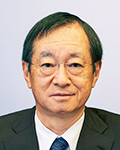Messages from Keidanren Executives and Contributed articles to Keidanren Journals October, 2021 About the ASEAN Market

ASEAN has grown with mutual respect for its diverse languages, ethnicities, and cultures. The stage of development varies from country to country. The per capita consumption of steel in countries such as Thailand and Vietnam (250 kg/year), where many manufacturers are located, differs to that of countries where future growth is expected, such as Indonesia and the Philippines (50 kg/year). The region's annual steel consumption at present is about 80 million tons, which is just 5% of global consumption, but it is expected to grow to 140million tons by 2030.
The Japanese steel industry has promoted the growth of ASEAN as a core base of the global supply chain, through the export of primarily high-grade steel, and full-fledged expansion of businesses at the down-stream processes since the 1980s. In addition, it has been promoting the development of foundational high-quality infrastructure. We see ASEAN as our second home market, and we have focused on this region as a market of the highest priority.
In Thailand, we established a joint venture (currently known as NS-SUS) in 1996, which has supplied high-quality steel products for a wide range of applications. Per capita steel consumption in Thailand has grown from 50 kg/year in 1990 to 250 kg/year in 2020, contributing to the construction of a robust supply chain. We are also engaged in the training of local human resources, and autonomous improvement activities have taken root, with NS-SUS being highly praised for TPM (Total Productive Maintenance) activities.
With regard to infrastructure development, Japan is leveraging its steel product technologies to address issues such as rapid urbanization, improved efficiency in logistics, and disaster countermeasures, and is working on projects including anti-flooding measures in Manila and container port development in Jakarta. Furthermore, Japan supports the development of each country by collaborating with local leading universities and public organizations in abstract areas such as the standardization of the utilization of steel products and promotion of steel structuring.
In recent years, China has been increasing its economic, diplomatic, and military influence over ASEAN, and its steel industry is also proactively expanding into ASEAN. Based on a strong relationship of trust, Japan can continue to contribute to sustainable growth and the resolution of issues through cooperation in the areas of carbon neutrality and digital technology in addition to infrastructure development. We will continue to contribute to the growth of ASEAN by strengthening our existing local business that we have been pioneering ahead of China, and by moving on to the next stage of business that generates even higher added value.

